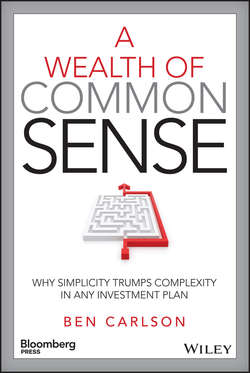Читать книгу A Wealth of Common Sense - Carlson Ben - Страница 7
На сайте Литреса книга снята с продажи.
Introduction:
Why Simplicity Is the New Sophistication
How Hard Can It Be?
ОглавлениеOver the course of my career I've invested in, advised on, or performed due diligence on nearly every investment strategy, asset class, security, or product type that you could think of. You name it; I've been involved with it in some fashion. I've worked with high-net-worth individuals, low-net-worth individuals, and million- and billion-dollar institutional portfolios. One thing I can say for certain through this experience in the markets is that it is not easy being an extraordinary investor. It's quite rare and extremely difficult.
How difficult? Neurologist-turned-investor and author William Bernstein says that there are four basic abilities that all investors must possess in order to be successful: (1) An interest in the investing process, (2) math skills, (3) a firm grasp of financial history, and (4) the emotional discipline to see a plan through. Bernstein doesn't have much faith in the prospect of most investors in the pursuit of excellence; he states, “I expect no more than 10 percent of the population passes muster on each of the above counts. This suggests that as few as one person in ten thousand (10 percent to the 4th power) has the full skill set.”9
I agree with Bernstein that there is only a very small subset of investors that have the combination of skills he lists as well as the ability to achieve extraordinary investment returns. Not only does it require intelligence, a solid investment process, and an ability to think differently than the crowd, it also requires a dose of luck in many cases. This is why the majority of investors shouldn't be shooting for extraordinary. Legendary investor Benjamin Graham once said, “To achieve satisfactory investment results is easier than most people realize; to achieve superior results is harder than it looks.” This is the problem most investors face – they are in constant search of superior results but they do not have the internal wiring, time, or skillset necessary to create that type of performance. Satisfactory results can actually allow you to be above average and beat 70 to 80 percent of all other investors. And it's much easier than most assume. You first have to give up on the dream of superior performance and realize only a small fraction of investors every actually get there. And most don't stay on top either (more on this later in the book).
The problem for average investors is that when they aim for superior results, it more often than not leads to below-average performance. It's amazing how easy it is to do worse by trying to do better. The single greatest challenge you face as an investor is handling the truth about yourself. This is why it's an unrealistic goal for the average investor to try to become the greatest investor in the world. A far more worthy goal is being better than average, which is totally realistic and achievable. Better than average can lead to impressive results in terms of investment performance over long enough time horizons. It's all about harnessing the power of thinking long-term, cutting down on unforced errors, and having the patience to allow compound interest to work in your favor.
The question is: How does one go about this?
Here is some standard investment advice that is both simple and effective:
1. Think and act for the long term.
2. Ignore the noise.
3. Buy low, sell high.
4. Keep your emotions in check.
5. Don't put all of your eggs in one basket.
6. Stay the course.
These are all great pieces of advice. The question is how. How do I know what long term even means for me? How do I buy low and sell high? How do I keep my emotions out of the equation? How do I diversify my portfolio correctly? How do I stay the course and reduce the noise that finds its way into my portfolio? These are the questions I seek to answer throughout this book. What to do is not nearly as important as how to do it.
The biggest problem for most people is that good investment advice will always sound the best and make the most sense when looking back at the past or planning ahead for the future. It will rarely sound so great in the moment when you actually have to use it. As you will see throughout, this is both extremely simple, but maddeningly difficult at the same time. As Warren Buffett once said, “Intelligent investing is not complex, though that is far from saying it is easy.”
This line sums up the point of this book very well.
9
William Bernstein, The Investor's Manifesto: Preparing for Prosperity, Armageddon, and Everything in Between (Hoboken, NJ: John Wiley & Sons, 2012).
